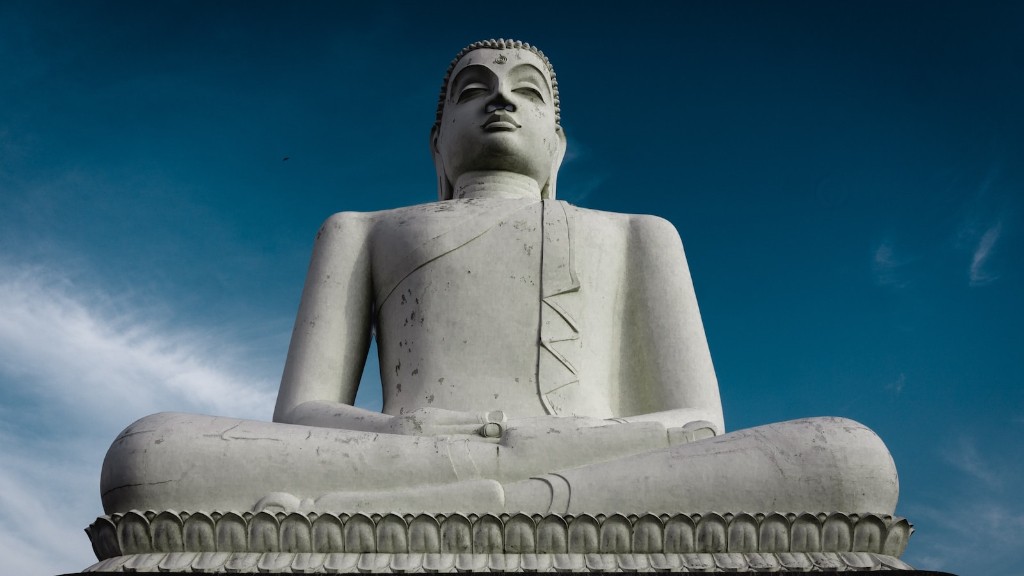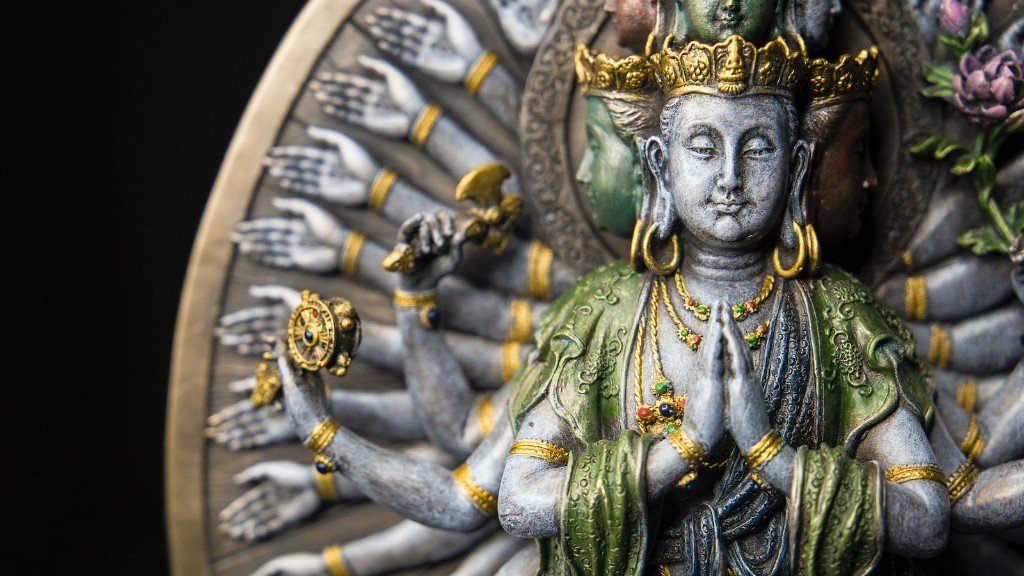Buddhism is a religion that began in India over 2,500 years ago. Buddhism teaches that people are reborn after death and that they live in an endless cycle of birth and death unless they attain Nirvana. Nirvana is a state of complete peace and freedom from suffering. To reach Nirvana, Buddhists must follow the Eightfold Path, which includes right understanding, right thoughts, right speech, right action, right livelihood, right effort, right mindfulness, and right concentration.
The main teachings of Buddhism are the Four Noble Truths and the Eightfold Path. The Four Noble Truths state that suffering is real, that suffering has a cause, that suffering can be ended, and that there is a path to the end of suffering. The Eightfold Path is that path, and it includes instructions on how to live in a way that will end suffering.
What are the 5 main teachings of Buddhism?
The Five Precepts are basic guidelines for living a moral and ethical life. The first precept is to refrain from taking life, which means not killing any living being. The second precept is to refrain from taking what is not given, which means not stealing from anyone. The third precept is to refrain from the misuse of the senses, which means not having too much sensual pleasure. The fourth precept is to refrain from wrong speech, which means not saying things that are hurtful or untrue. The fifth precept is to refrain from intoxicants that cloud the mind, which means not using drugs or alcohol.
Buddha’s teachings can help us in many ways. Here are 10 of his most important teachings:
1. The Four Noble Truths – Buddha’s most famous teaching is the Four Noble Truths. These truths teach us that life is suffering, that suffering is caused by our desires, that we can end suffering by eliminating our desires, and that this can be achieved by following the Eightfold Path.
2. The Eightfold Path – The Eightfold Path is the way to end suffering and achieve Nirvana. It consists of eight parts: right understanding, right thought, right speech, right action, right livelihood, right effort, right mindfulness, and right concentration.
3. The Three Universal Truths – The Three Universal Truths are that everything is impermanent, that everything is unsatisfactory, and that there is no self (no permanent soul or identity). These truths help us to see the world more clearly and to let go of attachments.
4. The Five Precepts – The Five Precepts are guidelines for living a moral and ethical life. They are to refrain from harming living beings, from taking what is not given, from engaging in sexual misconduct, from speaking falsely, and from taking intoxicants.
What are the three main teachings of Buddhism
Buddhism is a religion based on the teachings of Siddhartha Gautama, who was born in India in the 6th century BCE. The main principles of Buddhism are karma, rebirth, and impermanence. Buddhists believe that karma is the law of cause and effect, and that good deeds will lead to good consequences while bad deeds will lead to bad consequences. rebirth is the belief that after someone dies, they are reborn into another form, and that this cycle of birth and death continues until they attain Nirvana. impermanence is the belief that everything is temporary and that nothing lasts forever.
The Pāramitās are a set of virtues that are widely promoted in Buddhism. They are: Dāna (generosity), Sīla (proper conduct), Nekkhamma (renunciation), Paññā (wisdom), Viriya (energy), Khanti (patience), Sacca (honesty), Adhiṭṭhāna (determination), Mettā (Good-Will), and Upekkhā (equanimity).
What were 8 teachings of Buddha?
The Noble Truth of End of suffering speaks about the need to learn and have knowledge to cut off their ignorance. The first way to end these suffering is changing one’s views and must try to live in a natural way and must possess peaceful mind. The state when one ends their suffering and live a peaceful way is known as Nirvana.
The Eightfold Path is a series of eight steps that Buddhists can follow to help them lead a contented (satisfactory) life.
The first step is Right Understanding, which means understanding the Four Noble Truths and the law of karma.
The second step is Right Thought, which means having positive and noble thoughts, and avoiding negative and unwholesome thoughts.
The third step is Right Speech, which means speaking truthfully, kindly, and helpful words, and avoiding harsh, hurtful, and misleading speech.
The fourth step is Right Action, which means acting in ways that are helpful and beneficial, and avoiding actions that are harmful and hurtful.
The fifth step is Right Livelihood, which means earning a living in a way that is honest and beneficial, and avoiding occupations that are harmful or exploitative.
The sixth step is Right Effort, which means making a sincere effort to develop positive qualities and overcome negative qualities.
The seventh step is Right Mindfulness, which means being aware of the present moment and letting go of thoughts and feelings that are not helpful.
The eighth and final step is Right Concentration, which means focusing the mind
What are the core values of Buddhism?
Buddhists believe that people should try to end suffering; all things should be seen as having no self or essential nature. The main Buddhist values are love, wisdom, goodness, calmness and self-control.
The Four Noble Truths are the cornerstone of Buddha’s teachings, and provide a great deal of insight into the nature of existence. They show that suffering is real and caused by certain conditions, but that it is possible to end suffering by following the Noble Eightfold Path. The Four Noble Truths are an essential part of Buddha’s teachings and provide a great deal of wisdom for those who study them.
What is the ultimate goal in Buddhism
Nirvana is the goal of Buddhism and is achievable only through the elimination of all greed, hatred, and ignorance. Nirvana signifies the end of the cycle of death and rebirth and is a state of pure bliss.
The ‘Middle Way’ is the Buddhist way of life; a self-development progression through the Noble Eight-fold Path which comprises Right Understanding, Right Thought, Right Speech, Right Action, Right Livelihood, Right Effort, Right Mindfulness and Right Concentration.
The ‘Middle Way’ is the Buddhist way of life; it is a self-development progression through the Noble Eight-fold Path. The Path teaches about Right Understanding, Right Thought, Right Speech, Right Action, Right Livelihood, Right Effort, Right Mindfulness, and Right Concentration.
What are the 6 principles of Buddhism?
The six are (1) generosity (dāna), (2) morality (śīla), (3) patience (kṣānti), (4) vigor (vīrya), (5) concentration (dhyāna), and (6) wisdom (prajñā). The six paramitas are foundational to the Buddhist path and represent the core values that all Buddhists aspire to cultivate in their lives. Generosity, morality, and patience are considered the foundations of the path, while wisdom, concentration, and vigor are the supports. All six paramitas are essential for making progress on the path and achieving Buddhahood.
The will to kill is the manifestation of a deep seated hatred and violence. It is the complete negation of life. It is the manifestation of the will to destroy, to annihilate. It is the complete opposite of the will to live.
What is Buddhism vs Christianity
The main difference between Buddhism and Christianity is that Buddhism is not based on the idea of a God or a Creator. For Buddhists, the world is seen as being in a state of flux and change, and there is no need for a God to provide values or stability. Christianity, on the other hand, relies heavily on the idea of a God who created the world and sets down laws and guidelines for how humans should live. This difference is significant, as it means that the two religions offer different worldviews and perspectives on life.
The Buddha’s sayings were carried down orally after his death and were compiled into collections called suttas or sutras. These collections, plus the Vinaya Pitaka (monastic rules) and Abidhamma/Abhidharma (philosophical texts), comprise the Buddhist Canon.
What are the three most important facts about Buddhism?
Buddhism is a religion that originated in India, and now has followers all over the world. It is the fourth largest religion in the world, with 360 million followers. Buddhism does not believe in a supreme being or creator god. Instead, it focuses on Dharma, which is the righteous path that one should follow in order to live a moral life. Buddhists also believe in reincarnation, and that each person has the potential to achieve Nirvana, which is a state of perfect peace and enlightenment. There are many different types of Buddhism, such as Theravada and Mahayana, and each has its own unique set of beliefs and practices.
Buddha’s teachings on life and death are based on the idea of rebirth. According to Buddha, the spirit is reborn into another body after death and this cycle continues until the spirit is liberated from the cycle of life and death. Death can be an opportunity for the spirit to be liberated from this cycle and attain nirvana.
Warp Up
There are Four Noble Truths in Buddhism:
1. Suffering is an inherent part of life.
2. The origin of suffering is attachment.
3. Suffering can be ended by letting go of attachment.
4. There is a path to the end of suffering.
The main teachings of Buddhism are the Four Noble Truths and the Eightfold Path. The Four Noble Truths are that suffering exists, that suffering has a cause, that suffering can be ended, and that there is a path to the end of suffering. The Eightfold Path is a path of right understanding, right intention, right speech, right action, right livelihood, right effort, right mindfulness, and right concentration.




